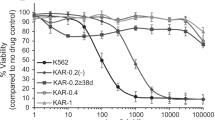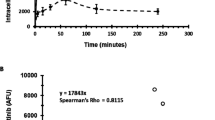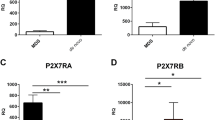Abstract
Although cellular drug resistance is considered to be an important cause of the poor prognosis of children with relapsed acute lymphoblastic leukaemia (ALL), the knowledge of drug resistance in these patients is very limited. Different aspects of drug resistance were studied in 17 children with relapsed ALL. The in vitro sensitivity profile was determined using the MTT assay. Cells from relapsed children were significantly more resistant to 6-thioguanine, prednisolone, cytosine arabinoside, daunorubicin (DNR), mustine-HCl and mafosfamide but not to L-asparaginase and vincristine (VCR) than cells from 41 children with ALL at initial diagnosis. Some relapsed patients showed a general drug resistance while others were resistant to only 1-3 drugs. The relevance of the multidrug resistance (MDR) model was analysed: In all DNR- and VCR resistant cases a co-resistance to drugs not involved in the MDR model was found. P-glycoprotein was not detected in any of 28 untreated and 14 relapsed samples tested. VCR- and DNR accumulation in the most resistant cells were not lower than in sensitive cells. Resistance modifiers did not potentiate the cytotoxicity of VCR and DNR. We conclude that resistance to anthracyclines and vinca alkaloids in childhood relapsed ALL is not due to P-glycoprotein mediated MDR. Different types of drug resistance varying from a resistance to only one drug to a general chemoresistance, can be detected in children with relapsed ALL. VCR and L-asparaginase seemed to be only infrequently involved in drug resistance. Knowledge of drug resistance might lead to more effective and less toxic therapies for children with relapsed ALL.
This is a preview of subscription content, access via your institution
Access options
Subscribe to this journal
Receive 24 print issues and online access
$259.00 per year
only $10.79 per issue
Buy this article
- Purchase on Springer Link
- Instant access to full article PDF
Prices may be subject to local taxes which are calculated during checkout
Similar content being viewed by others
Author information
Authors and Affiliations
Rights and permissions
About this article
Cite this article
Pieters, R., Hongo, T., Loonen, A. et al. Different types of non-P-glycoprotein mediated multiple drug resistance in children with relapsed acute lymphoblastic leukaemia. Br J Cancer 65, 691–697 (1992). https://doi.org/10.1038/bjc.1992.146
Issue Date:
DOI: https://doi.org/10.1038/bjc.1992.146
This article is cited by
-
Pharmacokinetic interactions of cyclosporine with etoposide and mitoxantrone in children with acute myeloid leukemia
Leukemia (2002)
-
The importance of Phase I/II trials in pediatric oncology
Investigational New Drugs (1996)
-
Multidrug resistance in pediatric oncology
Investigational New Drugs (1996)
-
Cellular drug resistance in childhood leukemia
Annals of Hematology (1994)
-
P-glycoprotein-mediated multidrug resistance in normal and neoplastic hematopoietic cells
Annals of Hematology (1994)



